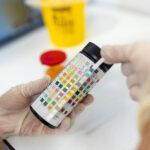The scoop on GBS
It’s International Group B Strep Awareness Month. Here’s what you […]

The American Pregnancy Association states, “Group B streptococcus (GBS) is a type of bacterial infection that can be found in a pregnant woman’s vagina or rectum. This bacteria is normally found in the vagina and/or rectum of about 25 % of all healthy, adult women.” If you have GBS, you can pass it to your unborn baby, and though rare, the consequences of a baby contracting GBSare life-threatening. So, doctors recommend a routine screening of expecting moms between the 35th and 37th week of pregnancy.
You won’t know if you have GBS either says the American Pregnancy Association, “The bacteria that causes group B strep normally lives in the intestine, vagina, or rectal areas. Group B strep colonization is not a sexually transmitted disease (STD). Approximately 25% of all healthy women carry group B strep bacteria. For most women there are no symptoms of carrying the GBS bacteria.”
Testing positive for GBS doesn’t automatically mean it will pass to your baby, it only means you are a carrier of the infection. A woman who tests positive for GBS will be advised to have an IV with antibiotics during delivery or to consult her midwife about homeopathic ways of preventing GBS from passing to her baby during labor.Signs and symptoms of early-onset GBS (occurring hours after delivery) of an infant include: breathing problems, heart and blood pressure instability, gastrointestinal and kidney problems, sepsis, pneumonia and meningitis.
Babies are treated with an antibiotic similar to how women are treated. Also, there’s a chance (though it is very small) of a baby showing signs of late-onset GBS, which makes regular doctor’s visits even more important.
Lastly, some women will test negative at some times and not others so it’s important to do a GBS screening during each pregnancy.







